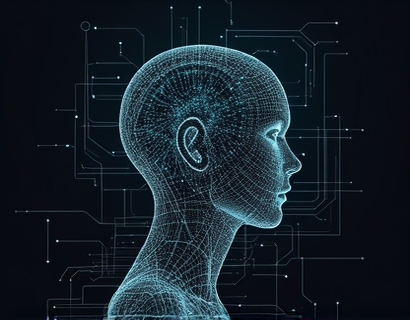AI-Generated Podcasts: Pioneering the Future of Engaging Audio Experiences
In an era where technology and creativity converge, AI-generated podcasts are emerging as a groundbreaking force in the audio content landscape. These innovative productions leverage advanced algorithms and machine learning to craft immersive, engaging content that redefines listener engagement and transforms the discovery of insightful discussions on any topic. For tech-savvy enthusiasts, the integration of artificial intelligence in podcast creation represents a significant leap forward, offering a unique blend of technology and storytelling that captivates and informs.
The concept of AI-generated podcasts is not merely about automating the production process but about enhancing the quality and relevance of the content itself. By analyzing vast datasets, AI systems can identify trends, preferences, and gaps in existing podcast offerings. This analytical capability allows for the creation of podcasts that are not only well-researched and informative but also tailored to the specific interests of target audiences. The result is a more personalized and engaging listening experience that keeps audiences hooked.
One of the key advantages of AI-generated podcasts is their ability to produce content at scale. Traditional podcast production relies heavily on human resources, which can limit the frequency and variety of episodes. AI, however, can generate multiple episodes simultaneously, ensuring a steady stream of fresh content. This efficiency is particularly beneficial for niche topics or specialized communities where consistent content is crucial for maintaining listener interest and loyalty.
The creative process behind AI-generated podcasts involves several sophisticated steps. Initially, the AI system is fed a comprehensive set of data, including topics, key themes, and desired tone. Using natural language processing (NLP) and generative models, the AI constructs scripts that flow naturally and coherently. These scripts are then refined through iterative learning, ensuring that the final product sounds authentic and engaging. The use of voice synthesis technology further enhances the realism, allowing the podcast to sound as if it were hosted by a human speaker.
Another significant aspect of AI-generated podcasts is their adaptability. These platforms can dynamically adjust content based on real-time feedback and listener interactions. For instance, if a particular segment receives high engagement, the AI can generate more content around that topic or similar themes. This responsiveness not only keeps the content fresh but also fosters a sense of community and interaction between the podcast and its audience.
The potential applications of AI-generated podcasts are vast and varied. In the realm of education, AI can produce detailed lectures and tutorials on complex subjects, making high-quality educational content more accessible. For professionals, industry-specific podcasts can be generated to keep listeners updated on the latest trends, research, and best practices. Entertainment is another area where AI-generated podcasts shine, offering everything from immersive storytelling to interactive dramas that adapt to listener choices.
For tech-savvy enthusiasts, the allure of AI-generated podcasts lies in the innovative use of technology to enhance traditional media. The fusion of AI and audio content creates a new paradigm where the boundaries between human creativity and machine intelligence blur. This synergy not only pushes the limits of what is possible in podcast production but also opens up new avenues for content creators and consumers alike. The ability to explore niche topics, receive personalized recommendations, and engage with dynamic content makes AI-generated podcasts a compelling choice for those seeking a more enriched audio experience.
The impact of AI-generated podcasts extends beyond the individual listener. For content creators, these tools democratize podcast production, lowering the barriers to entry and empowering a broader range of voices. Independent creators can now produce high-quality podcasts without the need for extensive resources or expertise. This democratization fosters diversity and innovation, leading to a more vibrant and inclusive podcast ecosystem.
Moreover, AI-generated podcasts contribute to the sustainability of the audio content industry. By reducing the reliance on human labor for content creation, these platforms can operate more efficiently, potentially lowering costs and making premium content more accessible. This efficiency also allows for more experimentation and risk-taking, as creators can test new ideas and formats without the fear of high production costs.
The technical underpinnings of AI-generated podcasts are rooted in advanced machine learning algorithms and natural language generation (NLG) techniques. NLG models, such as GPT-3 and its successors, are trained on massive datasets to understand and generate human-like text. These models can be fine-tuned for specific genres or styles, ensuring that the generated content aligns with the desired tone and format. When combined with voice synthesis technologies, the result is a seamless audio experience that mimics human speech.
One of the most exciting aspects of AI-generated podcasts is their potential for interactivity. Some platforms are exploring the integration of listener feedback and choices into the podcast narrative. For example, a listener could choose different paths in a story or influence the direction of a discussion. This level of interactivity not only enhances engagement but also creates a more personalized and immersive experience.
Despite the numerous benefits, the adoption of AI-generated podcasts is not without challenges. One of the primary concerns is the quality and authenticity of the generated content. While AI has made significant strides, there is still room for improvement in capturing the nuances and subtleties of human speech and emotion. Ensuring that AI-generated podcasts sound natural and engaging requires continuous refinement and testing.
Another challenge is the ethical use of AI in content creation. Issues such as copyright infringement, bias in AI algorithms, and the potential for misinformation must be carefully managed. Transparency in how AI-generated content is produced and clearly labeling such content can help build trust with listeners and maintain ethical standards.
Looking to the future, the integration of AI in podcasting is likely to become even more sophisticated. Advancements in AI research, such as improved NLP models and more realistic voice synthesis, will further enhance the quality and realism of AI-generated podcasts. The rise of 3D audio and spatial sound technologies could also play a role in creating more immersive listening experiences, making AI-generated podcasts indistinguishable from those produced by humans.
For tech-savvy enthusiasts, the future of AI-generated podcasts holds immense promise. The combination of cutting-edge technology and creative storytelling offers a new frontier in audio content consumption. As the technology continues to evolve, we can expect to see even more innovative applications and formats, further enriching the podcast landscape. Whether it's through educational series, immersive narratives, or interactive experiences, AI-generated podcasts are poised to redefine how we engage with audio content.
In conclusion, AI-generated podcasts represent a significant advancement in the world of audio content. By harnessing the power of AI, these podcasts offer a unique blend of technology and creativity that enhances listener engagement and expands the possibilities of what a podcast can be. For those who appreciate the intersection of technology and media, AI-generated podcasts are an exciting development that promises to transform the way we consume and interact with audio content.









































